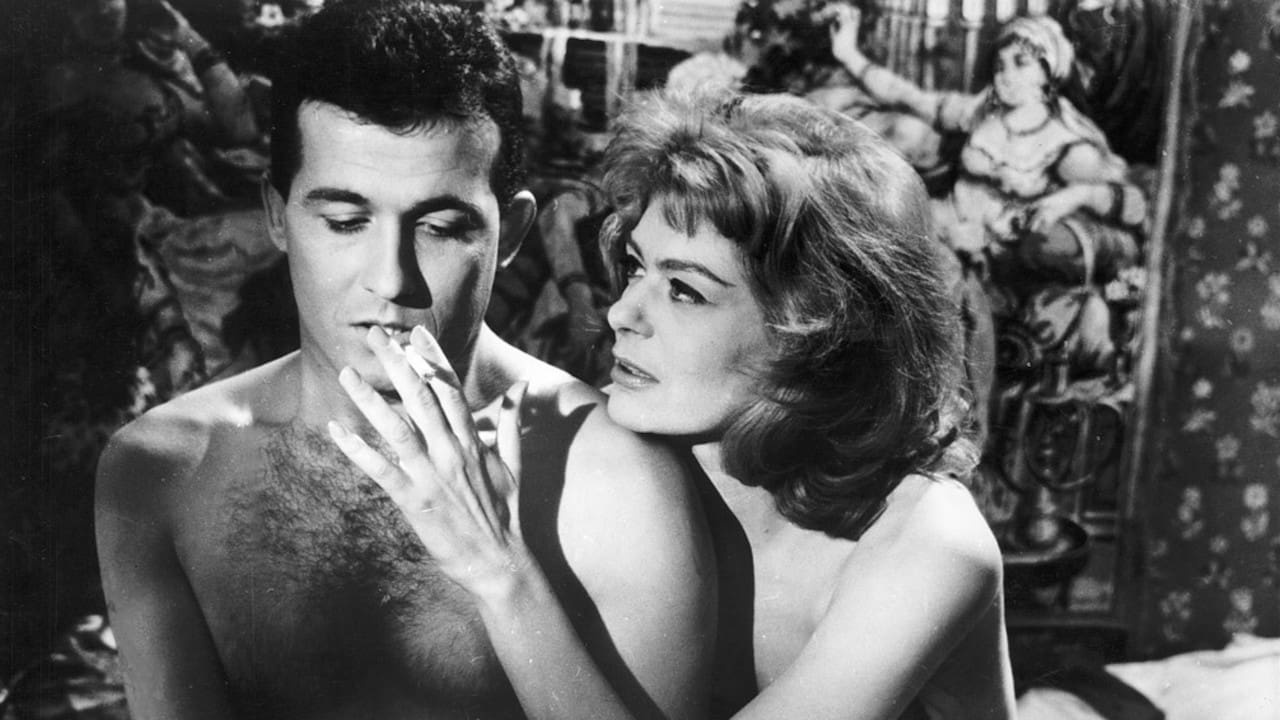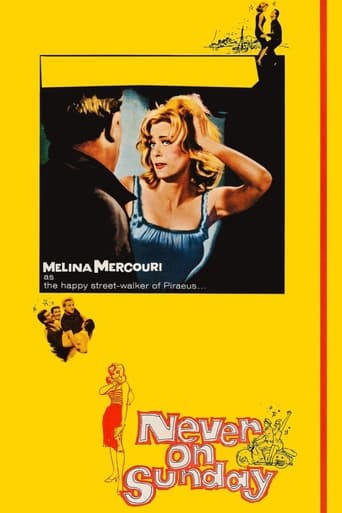TrueJoshNight
Truly Dreadful Film
Cathardincu
Surprisingly incoherent and boring
LouHomey
From my favorite movies..
ScoobyMint
Disappointment for a huge fan!
dlee2012
One of the greatest comedies of all time, Never on Sunday is an excellent examination of cultural imperialism and the clash between two very different outlooks.The character of Homer has the limitation of being unwilling to see the world through any other eyes but his own: his narrow-mindedness means he cannot see the very thing he is seeking on his quest. The Greeks have moved beyond a search for the truth, being content in their carefree lifestyle. The imperialist ambitions of ancient Athens are no longer a concern for them but, for the Americans, just setting out on their empire building, they are a priority.Homer's attempts to force the Greek population to fit his image of what they should be is an attempt at this very imperialism. Once the cradle of civilisation, he feels they should now conform to his world-view. Informed by the puritans and ancient philosophies long-rejected by the Greeks themselves, he forces himself onto a society onto which he cannot be grafted.He has the arrogance of an academic and does not understand human beings. His attempts at bettering Melina's character are attempts to force her to see his world-view. His belief he is truly bettering her is self-delusion.However, it is not solely the American character who imposes his view on others. Throughout the course of the film, the Greek port is visited in turn by the US, British and Russian naval fleets. Greece is clearly subjugated to each of these military empires now yet, somehow, it remains a happy place for they depart soon after, leaving the locals largely unaffected by their impositions.Melina's character's zest for life famously extends to the Greek tragedies. With the film's play within a play, she famously reinterprets the tragedy to conform to her world-view. Homer reacts angrily to this even though he is trying to force actual people to conform to his. (One has to wonder if Roland Barthes' "Death of the Author", published just seven years later was in anyway inspired by the ideas in this film of the audience constructing, albeit humorously, their own meaning and interpretation of the text.) The film's pace is fast and light-hearted and the many outdoor scenes reflect Melina's character's sunny mood. The soundtrack again is sprightly and energetic, encapsulating a zest for life and the film was exceptionally well-cast and acted.In the end, Homer of course achieves the aim of his quest by learning, when in Greece, do as the Greeks do. The simple lesson that it is love that will reform the girl is almost banal but here it works. She must be cared for and nurtured not forced to submit to the will of a foreigner.Ultimately, it is the comedy and the light-hearted way in which the moral of the story is expressed that makes this film delightful. Perfectly filmed and still humorous and highly relevant over fifty years after its release, this is one of the great comedies and one that this reviewer highly recommends.
lastliberal
To a committed hellenophile, this film represents all things that are great about Greece - the food, the music, the people.First, there is the incomparable music of Manos Hatzidakis, who won an Oscar for the title song.Then, there is Melina Mercouri, the star of the film, who won at Cannes for her role, as well as getting an Oscar and BAFTA nomination. The Minister of Culture after the fall of the dictatorship in Greece, she was magnificent.She later married the writer/director of the film, Jules Dassin, who received two Oscar nominations for this film, as well as a BAFTA nomination. Dassin is also well know for the film Rififi.Watching film is a trip back to the old Greece when the spirit was high and people lived life to the fullest. It is a trip worth taking many times.
macpet49-1
This movie is almost wonderful and it is totally due to Ms. Mercouri's efforts. She steals every scene she is in by just being fabulous to watch, not unlike Magnani was or Garbo. It was the misfortune of either her choice or her director's to put Jules Dassin in the primary male role. I have not seen such self-aware acting since high school plays. His gestures are huge and overblown and one is completely aware all the time of his actory acting getting in the way of his losing himself in the character. In that Ms. Mercouri eventually married him, I must conclude she had something to do with his being cast. What a fatal error. It is almost embarrassing to watch him. One is begging for the hook to swing onstage and grab him away. I can only suspect his primary experience before this was in live theatre where the exaggerated posturing he's adept at would not have been so obvious, perhaps to audiences of that time. Now, he looks as out of place as a silent film star in talkies who cannot figure out what to do next with his voice. Such a shame. He isn't even as awkward as someone picked up on the street in naivete because he might look like 'everyman'--all due to his staginess. The conclusion is, the film hasn't aged well and only because of his lame performance. Watch it for Melina and use his scenes to steal to kitchen for some treats in between.
Galina
Melina Mercouri, "The Last Greek Goddess", stars in the comedy "Never on Sunday"(1960) directed/written by Jules Dassin. She plays Illia, the most sensuous and radiant "lady of the night" in the seaport Pyres where every man adores her and she is the one who chooses her partners. Mercouri was 40 years old when she played Illia but she did not hide a single day of her age and she was gorgeous, full of the inner fire and absolutely irresistible. When the new Pygmalion, the intellectual American named Homer (of course) sails into the town and meets Illia, he decides that his search for meaning of life would end in Pyres if he would reform Illia and make her change her way of life. With all his intellect and education he couldn't understand a very simple truth about Illia - only true love might change her. Homer played by director/writer Jules Dassin is the weakest part of this mostly charming comedy. I agree with one of the IMDb commenters who said that "Jules Dassin has directed a great movie but he should have hired an actor to play Homer, and not played it himself... A better actor might have found a way around the rough spots but Dassin magnifies them." I guess that in real life Dassin was much more charming that in the film because he and Mercouri were married in 1966 and stayed married until her death in 1994.7.5/10

